Inside 'Holes': Digging into how the award-winning novel became a surprise cult classic for Disney
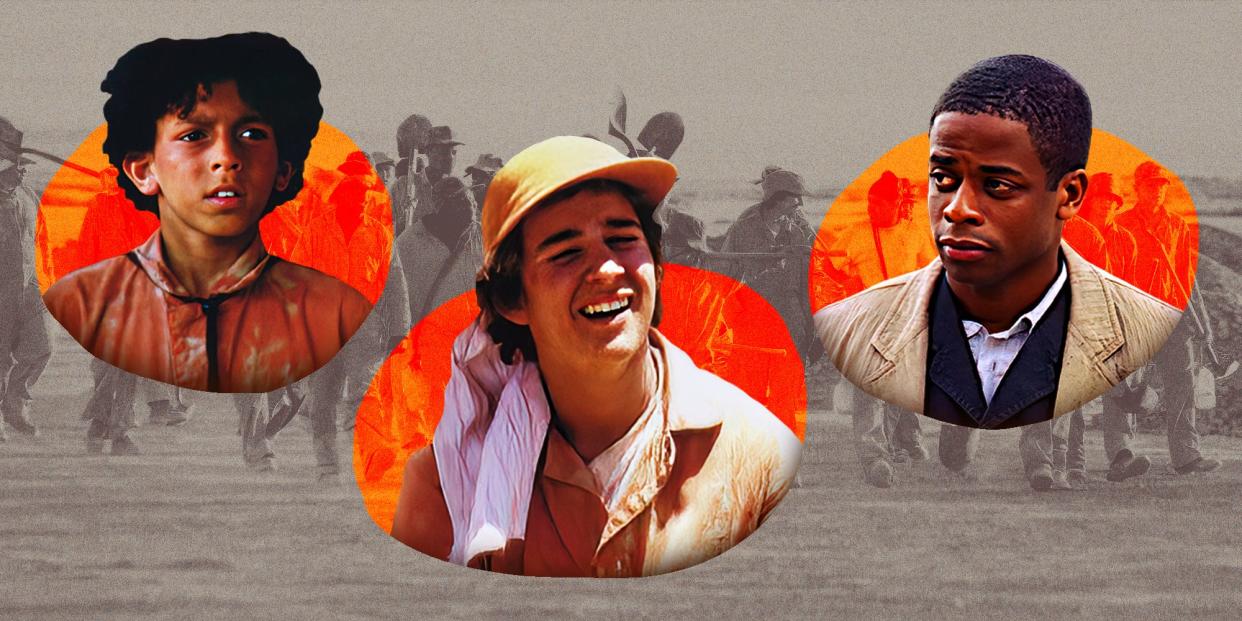
In an oral history, the director, writer, producers, and stars of "Holes" break down everything they remember about making the film 20 years ago.
In the summer of 2002, a sprawling cast and crew gathered in the California desert to make "Holes."
As the cameras rolled, iconic scenes from Louis Sachar's National Book Award-winning novel sprang to life: Young boys dug holes in distressed orange jumpsuits, forced to search for a long-lost Texas treasure; lizards scattered across the hot sand; and Sigourney Weaver slapped Jon Voight's face with a venomous sting.
Helmed by the action director Andrew Davis, the coming-of-age story, set in a Texas correctional boot camp, was bolstered by Disney backing and an impressive cast that included Weaver, Voight, Shia LaBeouf, Tim Blake Nelson, Dulé Hill, Patricia Arquette, Henry Winkler, Siobhan Fallon Hogan, and Eartha Kitt.
To celebrate the 20th anniversary of "Holes," Insider spoke with members of the cast, two producers, the director, and the writer to find out what it was like filming what soon became a cult classic.
In 1998, Sachar published "Holes," a young-adult novel about boys at a correctional boot camp in Texas. It became a mainstay in English classrooms nationwide, and by the early 2000s, directors and producers were vying for the film rights. They eventually went to director Andrew Davis and his production team.
Louis Sachar, author and screenwriter: Ever since "Holes" won the National Book Award and then the Newbery, there was a lot of interest in film rights.
Teresa Tucker-Davies, executive producer: It was before "Harry Potter," before any of those great-big family young-adult fiction books were being made into films. I read the book and thought, "Oh boy, this is it."
Sachar: I didn't want someone to make it into a fluffy children's story. I wanted it to be gritty and tough.
Andrew Davis, director: The studio originally hired somebody else to try to adapt the book into a screenplay, and this idiot tried to change the whole book.
Tucker-Davies: That writer came back with this insanely dark, dystopian film not even anywhere close to the story.
Davis: I was wondering what the hell was going on with this project. At that point I said, "You know what? Louis should get credit for this. They're his characters, it's his story."
Louis Sachar
Instead of looking for a new screenwriter, Davis and Tucker-Davies hired Sachar, who'd never written a screenplay before.
Sachar: Andy was persistent in having me write the screenplay. At the time, I didn't realize just how special that was — he was really going out on a limb for me.
Tucker-Davies: Andy never wanted to work with any screenwriter other than Louis. He wasn't used to writing screenplays, but you know, he's obviously a great writer.
Sachar: We storyboarded the whole script, and Andy would take all the scenes and put them on little 3-by-5 cards and stick them up on his wall. All this was new to me, but "Holes" is the only book of mine that's ever been made into a movie, so I wanted it done right.
Davis: Teresa and I literally sat down with him and we worked on it together. We didn't get credit, but basically we had a wall with all kinds of cards on it.
Sachar: After my initial script got sent out for a rewrite, I sent Andy a long letter just detailing different things I thought were wrong. Teresa actually told me that Andy kept that letter in his back pocket and was always referring to it throughout the movie.
Davis: "Holes" was wonderful because it was an independent movie that had studio distribution and financing in place. That's rare.
Marty Ewing, executive producer: Disney really wasn't involved. It's not like they were on the set. It's not like they gave us creative notes that I saw. It's not that they challenged the director's vision at all.
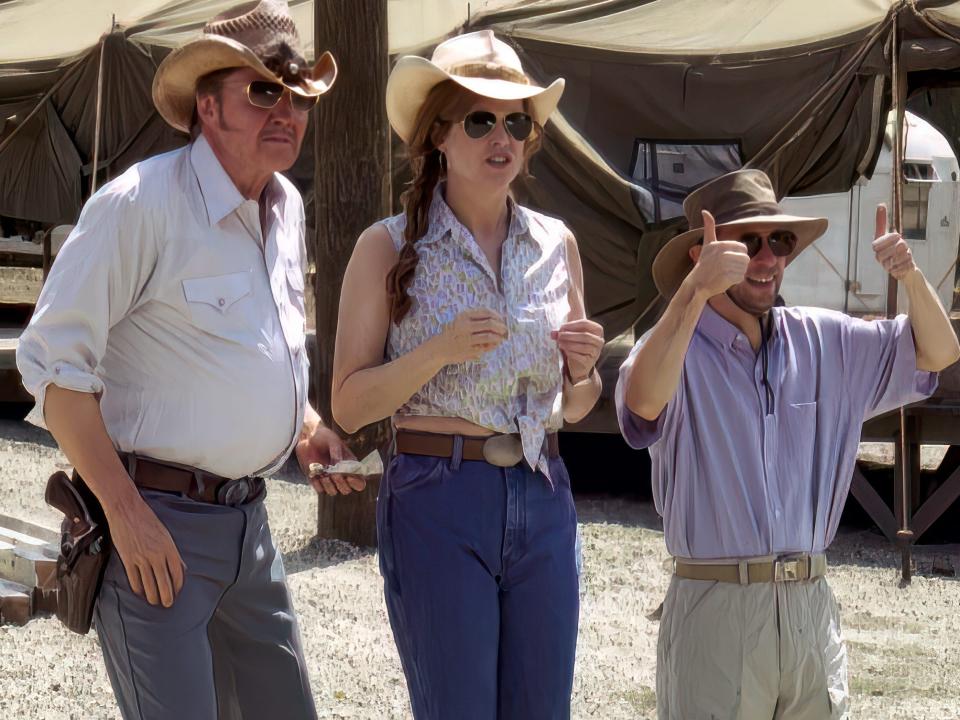
When it was time to cast "Holes," Davis turned to the legendary Hollywood casting directors Cathy Sandrich Gelfond and Amanda Mackey. Established actors like Voight, Weaver, and Nelson were offered parts without auditioning.
Tim Blake Nelson, Dr. Pendanski: I was offered the part by Andy Davis, and I hadn't read the novel yet. I didn't quite get the character as scripted, and my initial inclination was to say no.
Siobhan Fallon Hogan, Stanley's Mother: At the time, they said the money wasn't gonna be huge — the bigger actors were taking less than they normally would. But Andy knew it was great material.
Nelson: Andy was treating this as though he was making an adult film and that aesthetic wasn't gonna be driven by any dumbing down of the material.
Dulé Hill, Sam the Onion Man: When you have all these people like Jon Voight, Sigourney Weaver, Eartha Kitt, Patricia Arquette, Tim Blake Nelson, and Henry Winkler in the cast, it's like, come on, let's do this thing. Once I knew who was in the cast, I was that much more honored to be a part of it.
Nelson: The adult cast was a pointer to me that it wasn't gonna be a kids' movie. I can't imagine the depth of regret I would have felt if I'd gone to see the movie with my children and missed out on getting to play the role.
The production team focused on finding a group of young actors to play the kids, which included traveling around to high schools and holding open casting calls.
Davis: We were looking for our lead, Stanley, for a long time.
Ewing: Andy showed me some of Shia LaBeouf's audition tapes, and we were both mesmerized by this young kid. We thought he was like a young Dustin Hoffman type. It was a no-brainer to cast him in the movie.
Davis: I knew right away Shia was the kid.
Khleo Thomas, Zero: The first time I heard about the film was at a casting call. Disney was looking for young actors who had the edge of a Bow Wow type or a Lil' Romeo. I had a lot of competition at the callbacks.
Miguel Castro, Magnet: I originally auditioned through my agent, but I didn't book anything. I was horrible. I auditioned again when the production team came to my high school in South LA looking for kids, and I guess they forgot who I was.
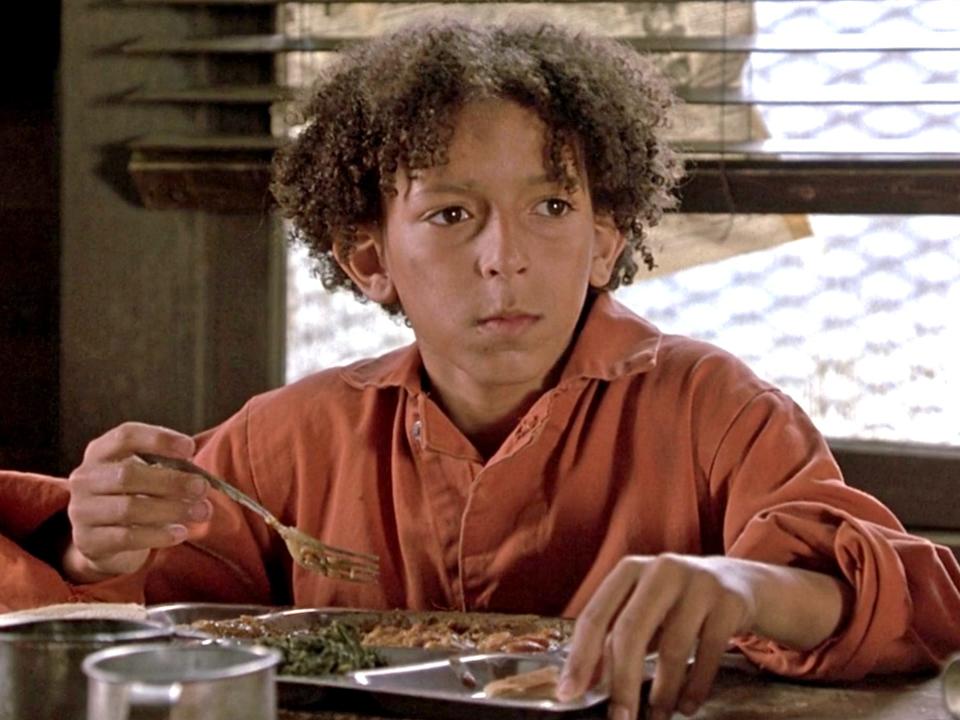
Thomas: I only got a chance to do one thing — sit next to Shia and go through the scene of Stanley teaching Zero how to read. They told us to scrap the script and improv to see what we'd come up with. Shia and I just had chemistry. We immediately connected and the rest is history.
Davis: Khleo's Zero was just perfect. He was this delicate kid who could be vulnerable and picked on, so it worked out really well.
Castro: When I met Louis, he told me I was exactly how he wrote Magnet — skinny, squeaky, and raspy voice, very annoying. You're messing with Disney, bro. They're going to find exactly what you need.
Thomas: Zero is not the most Disney-friendly character. Like he was grabbing eight balls ready to fight, he hit a guy with a shovel, he choked somebody else out. I kept thinking how this character I'm playing might be the biggest gangster in Disney history — it was crazy.
Castro: After I was cast as Magnet, my agent sat me down and told me this movie was gonna blow me up and I might become the biggest Latino actor.
Miguel Castro
Once the cast was in place, Davis figured out where to shoot the movie. The cast and crew ended up splitting filming time between Hollywood soundstages, the Disney Ranch in Santa Clarita, California, and Ridgecrest, California, in the Mojave Desert.
Davis: We went out to this place called Cuddeback dry lake bed, near where the US Navy tests their missiles out in Ridgecrest. We had to create a whole tent area where people could get out of the wind or sun.
Castro: We had to do six to eight weeks in boot camp because we actually filmed in the desert. We had to get prepared to be under weather conditions of 115 degrees Fahrenheit and higher.
Davis: Alex Daniels, the stunt coordinator, took the kids and had them digging holes. They had to get callouses on their hands and learn how to do it.
Castro: I loved the boot-camp part. When it started getting to filming, you have to memorize lines, that was the rough part for me.
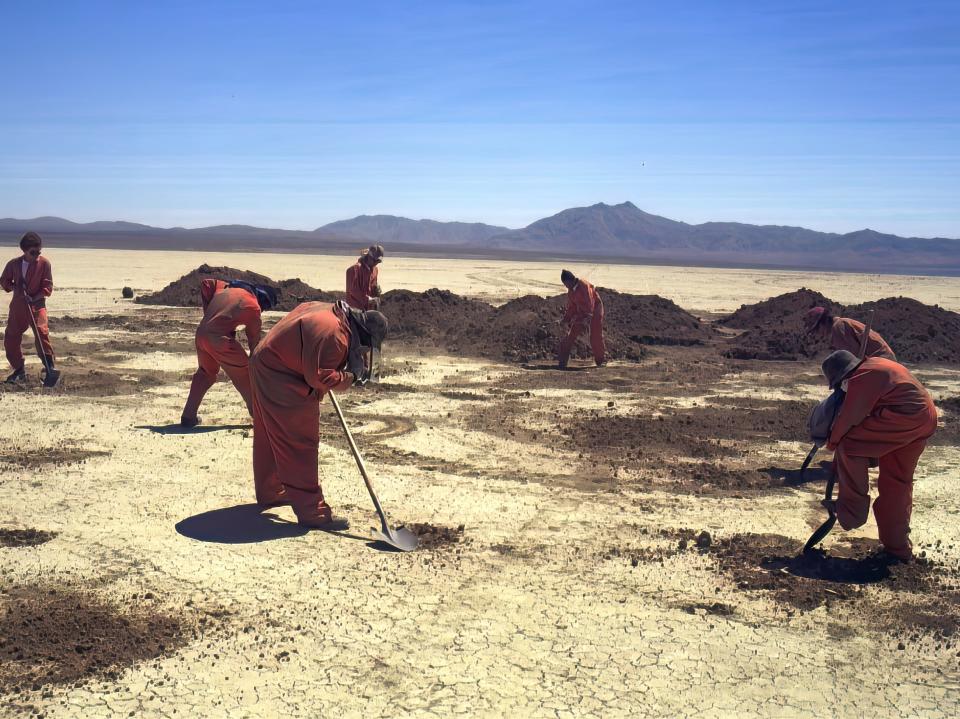
Hill: It wasn't a glamorous Hollywood set. We were out there in the boondocks.
Castro: The hardest part for me filming was the heatstroke. I mean we got to a point where we were hitting 104 degrees, and it was nothing to us anymore — that was a chill day.
Davis: It was quite intense. It was very, very hot inside of those holes and we had to have the kids sprayed down and hydrated to make sure they were gonna be safe.
Castro: I remember one day was 119 degrees. I thought they were gonna cancel the filming, but we all agreed to knock it out. I was hallucinating, and I started seeing water, a swimming pool. The production team gave us thermometers to check the temperatures of our holes. If the holes hit over 125 degrees, we had to get out of there. That day, some of our thermometers broke 130.
Tucker-Davies: The kids were brave, but I'm kind of a wimp. When dust storms came up, even though I was a full-fledged producer on the film, I'm embarrassed to admit that I just went to my trailer because it was brutal.
Ewing: The storms shut us down for an afternoon or two. They were very strong, and you couldn't see.
Thomas: There are scenes in the finished film where you're seeing the crew get swept up in an actual sandstorm in one of the shots.
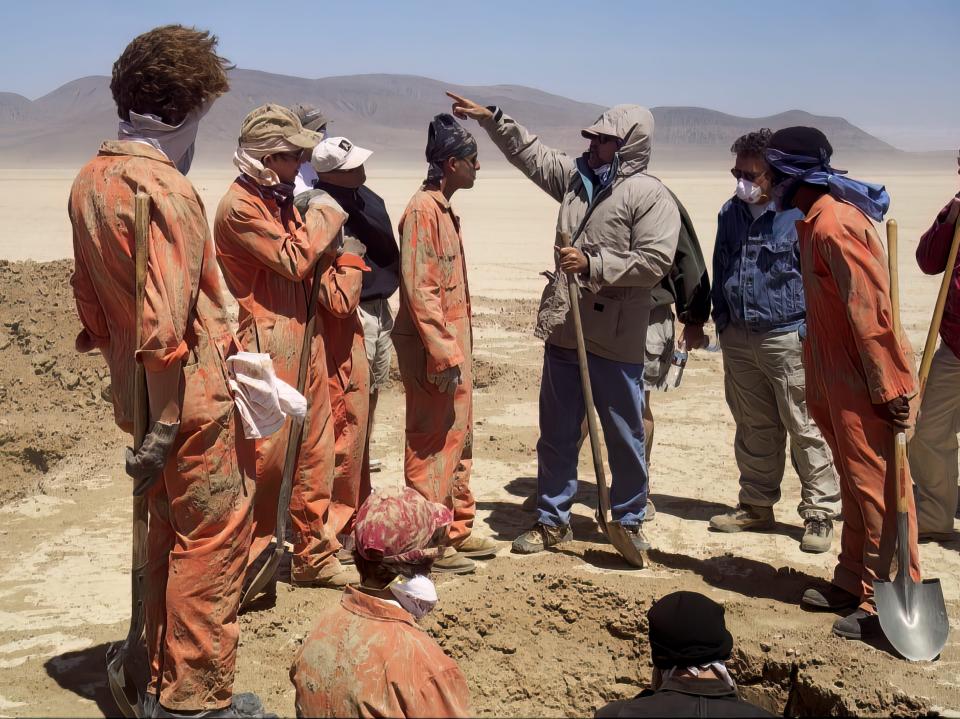
The environment on set wasn't all heatstroke and sandstorms. The child actors spent up to six hours in school on top of their filming schedules, but they also hung out with and learned from the veteran actors on set.
Castro: We were working from 12 to 16 hours a day. It was kind of heavy, but it was all worth it.
Tucker-Davies: I'd make the cast and crew hot tea in my trailer when they wanted to get away from it all.
Thomas: Us kids shot for three months in the summer, and it was kind of like camp. But this was a stacked, legendary cast, so I immediately understood my responsibility to be a professional.
Davis: Jon Voight was very gracious as a mentor to everybody.
Castro: The experience of being with Jon Voight, you know, with that big name? That big heart? I was freaking out. I was just a kid from South LA being put around all of these important people.
Thomas: One day Sigourney Weaver came around the corner in full wardrobe as the Warden and I didn't see Sigourney, I saw Ripley from "Alien." My brain exploded, and I froze instantly.
Davis took adapting Sachar's book seriously, and from day one, the director included the author in every step of the process.
Castro: We had to read the book and take a quiz on it and everything. The only two books I ever read in my life are "Holes" and "Harry Potter."
Hill: I really just tried to get as much information as I could from reading the book, from talking to Louis, from my imagination.
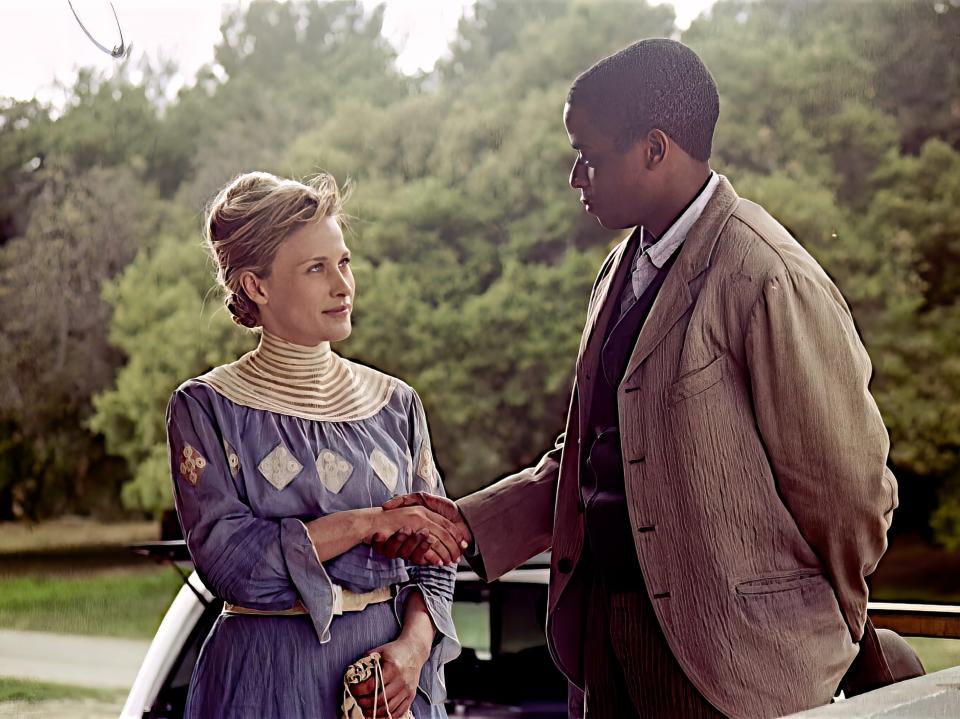
Castro: One thing I respect Andy for is that if Louis said to change something, he changed it. It was Louis' book, not Andy's.
Sachar: There was one scene where Sam is selling onions to a bald guy to make his hair grow — that happened to be the day Andy remembered he promised to put me in the movie. Because it wasn't in the script, I was the only bald person on set. I'm glad I didn't know about the cameo beforehand. I would've practiced my one line in the mirror until the words had no meaning left.
After months of filming were over, it was down to Davis and the editing team to turn "Holes" into an actual movie. Then the director had to team up with Disney execs to figure out how to promote the sometimes-dark family film.
Sachar: Andy would send me the tapes as it was getting cut down. The initial tape was four hours long, and then gradually, every few months, he'd send me another tape of it tightened.
Davis: In terms of the editing, we didn't have a lot of screenings where Disney executives told us to change things. We finished it and that was it.
Sachar: I'd always keep my fingers crossed to see if my part was still there.
Andrew Davis
Tucker-Davies: "Holes" is not really a full-on Disney brand. I think they had a little trouble with the marketing campaign. They didn't quite know what to do with it.
Castro: When I saw my poster at an AMC theater, my eyes got watery. I was like, 'Why am I the chosen one to do this? From all these Hispanic kids, why does it have to be me?' The theater employee let me and my date in for free that day.
"Holes," which had a $20 million budget, hit theaters on April 18, 2003, and earned $16 million on its opening weekend.
Davis: The good thing was "Holes" had a built-in audience because the book was so popular.
Ewing: "Holes" certainly had its own momentum once it was released. Even though it only went on to make $71 million, that number surprised us.
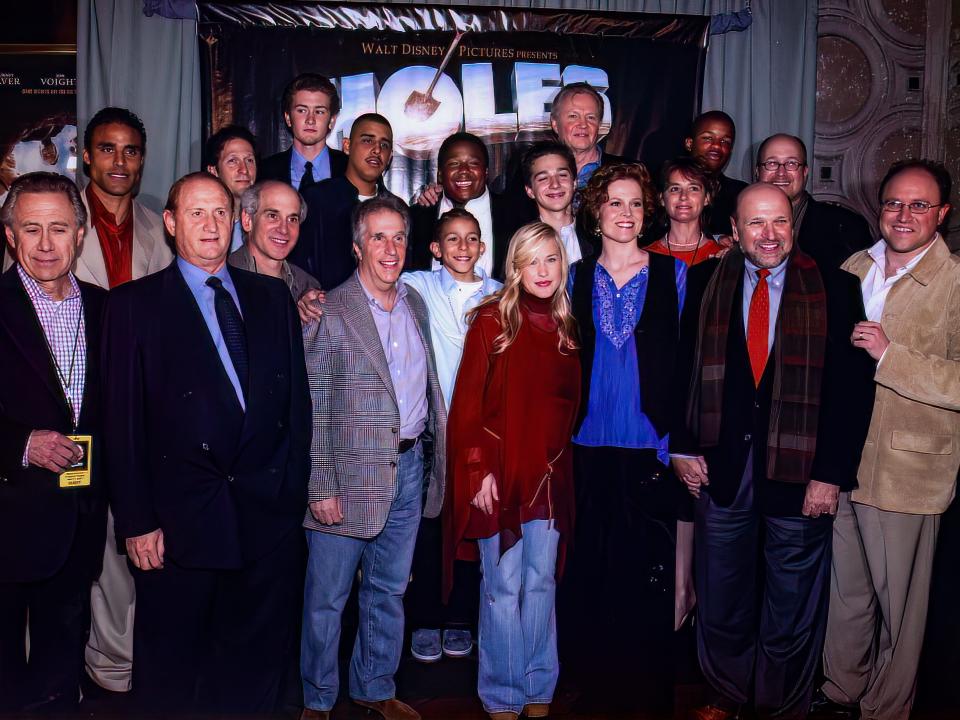
Nelson: I remember going to the premiere very well. I immediately understood how profoundly lucky I was to have been a part of something so special.
Castro: On the red carpet, 50 or 60 people were shouting my name and asking for my autograph. My agent didn't want me to go over to them, but I told her to let me live in that moment because I might not do this ever again.
Sachar: I pretty much knew the movie by the time I went to the premiere, although I just remember how surprised I was by how much I liked it. Even though I was on the set and I'd written it, it just didn't seem to be all that good while I was watching it being filmed. The editing made such a huge difference.
Davis: The head of Disney hadn't seen the movie before. When he did, he said, "Why aren't we in more theaters? This is a great movie!"
Nelson: It was quite clear this was gonna be a lasting film from the moment we all saw it.
Davis: The fact that we made a movie that people weren't disappointed in was great. Because usually, people say the book was better.
Louis Sachar
Twenty years later, "Holes" is still being introduced to new generations of readers and movie watchers.
Nelson: To me, reading Louis' novel is every bit as exciting as the first time you see a Picasso or a Kandinsky painting. And I don't think that appeal is gonna go away.
Thomas: This is a film that's lived on for 20 years. Do you know how many actors do something and then it's just gone in history?
Hill: People still come up to me today saying how they're such big fans of the movie. They always quote my character saying, "I can fix that." It really just amazes me.
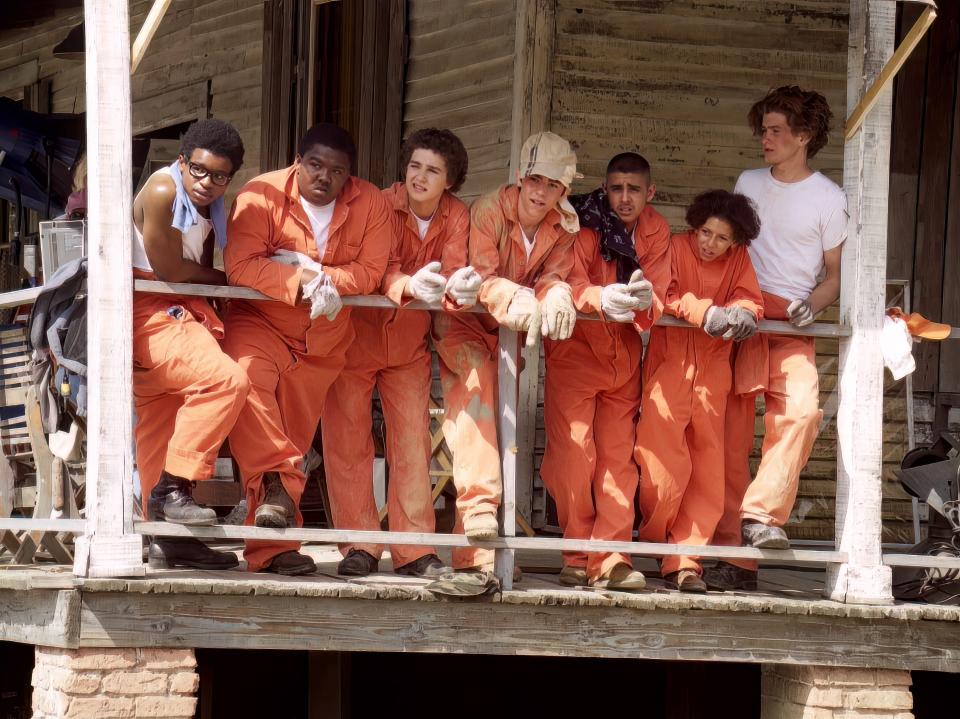
Thomas: It's a cult-classic film. When you think of Disney branding, there's merchandising, there are rereleases. And this film stood the test of time without any of that.
Tucker-Davies: "Holes" had really dark things. A family that was struggling, a boy that was falsely accused and falsely sentenced. But to deal with it in a way where the kids are resilient and the villains are conquerable, it's just wonderfully rewarding and hopeful.
Nelson: My agent at the time said, ultimately, all you want to do is show up in really good films. "Holes" remains one of the best films I ever did.
Fiona Clair contributed to the reporting of this piece.
Watch "Holes" with a Disney+ subscription:
Read the original article on Insider
